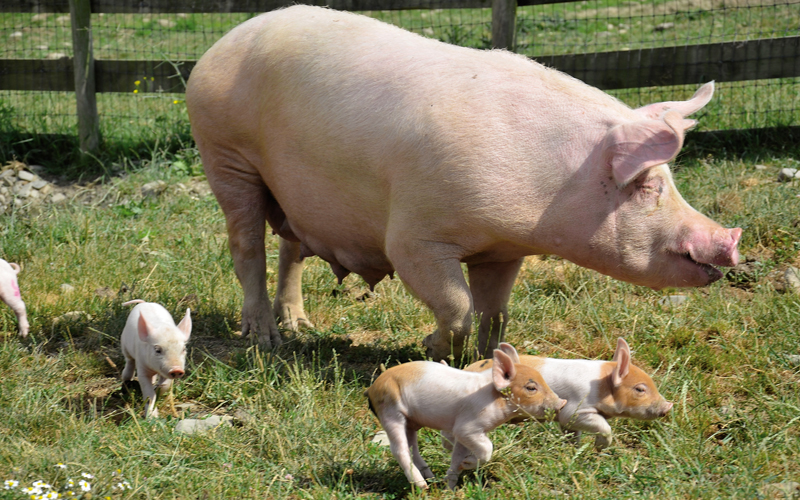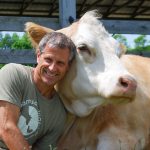
by guest blogger Gene Baur, activist, president and cofounder of Farm Sanctuary, and author of Living the Farm Sanctuary Life
Close your eyes and imagine this: You step out of your daily life and into a favorite storybook. You’re back with “The Farmer in the Dell,” standing in a beautiful green pasture. All around you roam the wonderful farm animals you’ve loved since you were a child—the sheep, the cows, the chickens, and more—all living in harmony. You feel a sense of tranquility around you and even inside you.
Wherever you look, you see complete contentment.
All seems to be right with the world, from sunrise when the roosters crow till sunset when the animals begin to become drowsy after a tough day of eating, ruminating, napping, and playing. You wonder, is this real? Or is this a fairy tale?
Now open your eyes.
This is a real place, in the real world.
This is Farm Sanctuary, the world’s premier refuge for farm animals. At our farms in New York and California, we provide comfortable homes for approximately 1,000 pigs, cows, chickens, ducks, geese, turkeys, sheep, and goats.
This is a place that gives back something most of us have lost and returns people to a simpler, happier time and place, where we lived more in harmony with nature, other species, and our core values.
We also do a great deal of serious educational work, such as keeping the public informed about the plight of factory-farmed animals. We hold 100-plus events and appearances a year, many featuring celebrities such as Martha Stewart, Ellen DeGeneres, Alec Baldwin, Emily Deschanel, Moby, Chevy Chase, and Alicia Silverstone. And we lobby vigorously for laws and policies that support animal welfare. Each year, we also host thousands of guests from all over the country who come to enjoy these extraordinary farms.
None of these creatures is ever eaten or used to produce milk or eggs; they live fully and freely for the rest of their existence. That’s why our visitors call Farm Sanctuary the “Happiest Place on Earth.”
My new book is designed to help you share in some of that happiness.
I want you to learn how you can bring the happiness of Farm Sanctuary into your own life. And not just happiness—you can also benefit from reduced stress, a trimmer waistline, increased health and vitality, and improved longevity. On top of that, you’ll be helping to make the world a better place!
Think about it. If you can live well and be happy without causing unnecessary violence, why wouldn’t you? For many people, it’s because they’ve developed bad habits without truly considering them. The Greek philosopher Socrates made an important point when he said, “The unexamined life is not worth living.” I believe this statement holds true for our food choices, as well: When we examine them, it’s clear we can do a lot better.
Of course, it would be wonderful if everyone who came to Farm Sanctuary or everyone who read the book immediately became a plant-based eater. I doubt that’s going to happen. But many of Farm Sanctuary’s visitors start on their vegan journey by making small changes in their diet. And small steps often lead to much larger ones.
For instance, just eating less meat is a great start. That’s how my own journey began. When I was in high school, I learned about the cruelty that young calves endure in veal production, and I swore off veal for good.
Here are 10 suggestions to help get you started on your own happiness journey:
1. Participate in Meatless Monday, a program endorsed by the Johns Hopkins Bloomberg School of Public Health. It encourages people to forgo meat one day a week (meatlessmonday.com).
2. Try learning more about specific food-industry practices and then avoiding the cruelest animal products, such as veal, caged eggs, chicken meat, and foie gras. This discourages inhumane practices and sends a market signal that such cruelty is outside the bounds of acceptable conduct in our society.
3. Use plant-based milks and creamers, such as those made from soy, rice, almond, or coconut, in place of cows’ milk on your cereal and in your coffee. There has been a huge increase in the flavors and varieties available in mainstream groceries in the past couple of years. I used soy milk for decades, and today, I prefer vanilla-flavored almond milk.
4. Shop at your farmer’s market for fresh seasonal produce. It’s healthy and supports a more local, humane, and sustainable food system. My farmer’s market favorites are berries and greens during the summer and squash and apples in the fall. Fruit is a sweet snack that can be enjoyed right away, and I sometimes snack on the greens, as well. When I travel, I love getting to know the local farming community and culture by visiting farmer’s markets.
5. Replace meat in recipes with plant-based options. For example, instead of meatballs, try veggie meatballs or even just veggies in spaghetti sauce. In many recipes, you can leave the meat out entirely. Check out the recipes in my book for plenty of dishes without meat.
6. Eat ethnic! The animal-centered diet we consume in the United States is a modern development. Explore and rediscover traditional ethnic dishes, including Chinese, Middle Eastern, Mexican, Indian, Ethiopian, and many others, which tend to be plant based.
7. Consider the advice of food experts and authors, such as New York Times columnist Mark Bittman, who suggests we go “vegan before 6:00,” or best-selling food expert Michael Pollan, who says, “Eat food. Not too much. Mostly plants.”
8. Enjoy fashion with compassion when shopping for clothes. For more information and tips, check out top fashion designer John Bartlett’s suggestions in my book.
9. Substitute! There’s a whole range of meatless meat substitutes, including veggie burgers and hot dogs, cold cuts, nuggets, cutlets, sausages, fillets, and even roasts. Explore and enjoy the many possibilities. You don’t have to give up your barbecues and picnics, but you can make them much healthier!
10. Get to know beans. There are so many different kinds of beans, and there’s so much you can do with them to add protein and flavor to your meals. I use white or garbanzo beans in salads to make them heartier, and I pack my chili with kidney and pinto beans. I like lentils and lima beans on their own with just a touch of seasoning. Also, I love beans with steamed greens, such as navy beans with kale or black-eyed peas with collard greens.

Gene Baur is the president and cofounder of Farm Sanctuary and has been hailed as “the conscience of the food movement” by TIME magazine. For more than 25 years, he has worked to stop the abuses of factory-farming and promoted compassionate living. He is a longtime vegan, marathon runner, and Ironman triathlete. He lives outside of Washington, DC. His book, cowritten with Gene Stone, titled Living the Farm Sanctuary Life, was published by Rodale Books in April 2015.




While I agree with your concept and love animals, eating is cruel whether you eat meat or not.
One example is the documentary: “More Than Honey”
I’ll eat my organic free pastured chickens before I would touch an almond.
We need to stop raising all our food (grain, plant, animals) as if it where a commodity.
Thank You
Thank you for all you do for our earth and our animals. I don’t eat meat, fish or fowl, but so far I still eat eggs. Am allergic to milk so that is easy to avoid. But I try to only eat organic as GMO’s make me ill. And there are so many chemicals in much of our food. True organic food is expensive but worth the good it does for my body, mind and soul! Again, thank you for all the good things you are doing for our world.
I don’t need to visit your sanctuary or read your book. I am very much in touch with country and the production of my food. We raise a large organic garden every year, have fruit trees and my next gardening venture is to plant berries. We also raise our own meat, we currently have a piglet in our barn have some chickens on order and will be getting a beef cow when our pasture fence is mended. None of our animals are mistreated or abused. We raise the pig on leftovers, edible weeds, home grown organic corn and our windfall apples. The beef cow gets sufficiently fat on pasture supplemented by corn.
This is nothing new to me since my family did the same thing despite living in a small town. My father’s response to my brother drinking a lot of milk was to buy a milk cow. We sold the excess to our neighbours.
The manure, a by product of our animals, makes a great soil additive as well as going into our compost. The problem is not with eating meat, it is our current method of meat production. Any type of factory farming is bad for the environment.
I agree, there is no problem with eating meat. Unless, of course, you’re dinner! Animals want to live as much as any one of us do.
Excellent responses from Judi and Marilyn. We need to change the way we raise our animals due to civilization. Hormonal growth, chemicals of all sorts which our forefathers never used. They fed themselves and made living out of it. So why GMO and many hazardous food being produced all over the world. God created everything for our enjoyment but some people are hiding under science to cause health problems from food production with various dangerous methods. Organic is the way forward.